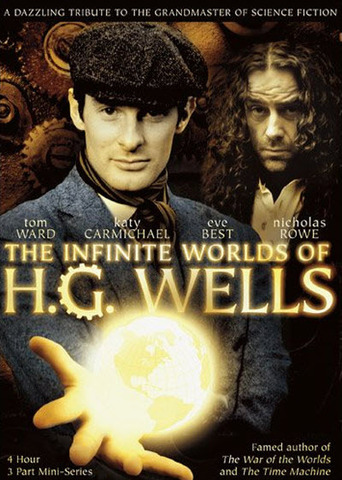

Collection of six Wells short stories, ranging from time travel to martians to "acceleration", tied together with an ongoing romance between Wells and a female scientist, set toward the end of the 19th Century. It's not a bad production, overall, but most of what is good about the series is owing to Wells' stories themselves; the acting, makeup and effects can be dodgy at times, but that's what you'd expect from a TV miniseries from across the Pacific. Rating: 6/10.
... View MoreThis was truly an engaging series, a sensational treasure to view. I thought about Steven Spielberg's Young Sherlock Holmes from years ago, which didn't work for me. Infinite Worlds did work wonders on me and I was more of a Jeremy Brett/Sherlock Holmes fan than I ever was an H. G. Wells fan.Infinite Worlds never gets too technical to leave someone out who may not grasp much about science and math, like me, nor does it get too ficticious, reminding one of Doctor Who. It was never campy either and never quoted Shakespeare. The acting never required going over the top, but it was right on level, no chewing up the scenery among these professionals. The feel, the imagery were all splendid.Of the six stories, the first two bordered on the most tragic, especially the first one, which set the stage for the entire program. The third one was reminiscent of War of the Worlds. Try not to think of Aliens too much, but the ending with Mrs. Cave and Davey the dog was very surprising. The fourth story was truly an original one done in an original manner, the last two were very romantic, I think the final one was truly the funniest and had me wishing there was more to see when it ended.An exceptional contribution that set the mood was undeniably Stanislas Syrewicz musical score, as it played each time to signify not that a movie was simply ending, but we were seeing closure in another H. G. Wells chapter.I recorded this program off, not sure if it was going to be a documentary or docudrama, so I didn't know what exactly to expect. I was not disappointed at all.Minus commercials, it runs about four and a half hours. How I would love to see more of this in some way shape or form. I would always say "there are worse things on you could watch" but in this instance I will say "there aren't many better things you can find to watch."
... View MoreI happened to watch this miniseries over the course of two nights on the Hallmark Channel and what a joy it was! The script was very well-done. All the supporting characters were nicely developed with very few light touches. The two main characters of H. G. Wells and his scientist wife were really charming. Their story of courting was told so effectively in parallel with the main storyline of various mysterious events. The period details were faultless and lively. I almost felt I was there with all of them! And the most important of all, the stories themselves (6 in total) gave me the kind of pleasure and fun mixed with curiosity that I used to feel two decades ago as a child, reading Jules Verne books and dreaming of those faraway exotic worlds and adventures. Thanks to everyone involved in this production.
... View MoreMy wife and I watched this over 3 nights on the Hallmark Channel. It was a good way to present 6 short stories, and HG Wells short stories are a much neglected resource.Good characterisations and nicely done in the late 19th century. Whilst some of the HG Wells Biography is ignored, I think that this was acceptable for what the programme aimed to achieve.We do hope that they consider making more :)I would say a 9/10
... View More